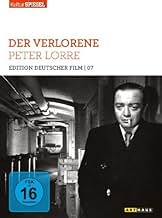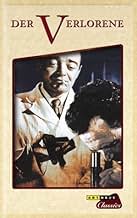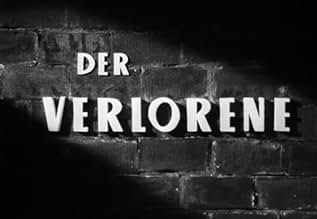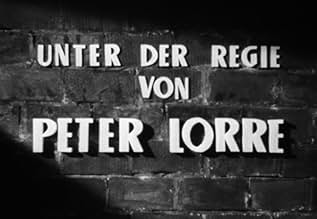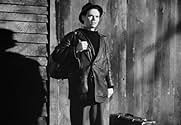Der Verlorene
- 1951
- 1 घं 38 मि
IMDb रेटिंग
7.0/10
1.2 हज़ार
आपकी रेटिंग
अपनी भाषा में प्लॉट जोड़ेंGerman scientist murders his fiancée during World War II when he learns that she has been selling the results of his secret research to the enemy.German scientist murders his fiancée during World War II when he learns that she has been selling the results of his secret research to the enemy.German scientist murders his fiancée during World War II when he learns that she has been selling the results of his secret research to the enemy.
- पुरस्कार
- 1 जीत और कुल 1 नामांकन
Helmuth Rudolph
- Colonel Winkler
- (as Helmut Rudolph)
Eva Ingeborg Scholz
- Ursula Weber
- (as Eva-Ingeborg Scholz)
Peter Ahrweiler
- Oberstleutnant Marquardt
- (बिना क्रेडिट के)
Josef Dahmen
- Lieske, canteen bartender
- (बिना क्रेडिट के)
Helmut Eichberg
- Oberstleutnant Bydersahn
- (बिना क्रेडिट के)
Kurt Fuß
- Baldheaded Man
- (बिना क्रेडिट के)
Joachim Hess
- Leutnant
- (बिना क्रेडिट के)
Richard Münch
- Criminal Inspector #1
- (बिना क्रेडिट के)
फ़ीचर्ड समीक्षाएं
Following a period of rehabilitation where he managed to beat his addiction to morphine, character actor extraordinaire Peter Lorre felt confident enough not only to leave his secure employment as a lean, sleek villain in myriad Hollywood noirs and go back to his native Germany after almost 20 years (which, like many compatriots, he had fled when the Nazis came to power) but also to embark on his sole foray behind the camera. Adopting an unfussy technique but a compelling flashback structure, Lorre turned out a truly remarkable piece of work that, equally unsuccessful on its first release as Charles Laughton's THE NIGHT OF THE HUNTER (1955) and Marlon Brando's ONE-EYED JACKS (1961), has yet to have its somewhat maligned reputation vindicated in the same unequivocal manner as these two 'one-hit wonders' by actors-turned-directors. A chubbier, infinitely world-weary Lorre gives a haunting central performance as the dedicated, real-life scientist Dr. Karl Rothe who, being told by his superiors that his discoveries were being passed on to the allied forces by his beautiful (and much younger) fiancée, strangles her in a moment of silent rage upon returning to the lodgings he shares with his mother-on-law and her cat; the actress playing Lorre's first victim (Renate Mannhardt) makes such an indelible impression on the spectator that, upon a second viewing, one is surprised to discover how brief her appearance in the film actually is. Changing his identity and now serving as a medical doctor in a refugee camp, Lorre is brought once again face to face with his inner demons in the shape of his assistant during WWII who, apart from having carried on an affair with Lorre's wife, was secretly also an important Party official investigating the infamous "Night Of The Long Knives" conspiracy (which is rather murkily dealt with in the film's latter stages); another enigmatic aspect of Lorre's personality that is somewhat oddly thrown into the mix is his troubled dealings with other women over the years, culminating in another murder committed in a stationary train carriage. Interestingly, the film opens with a shot of a moving train out of which emerges the tiny figure of Lorre walking towards the refugee camp and ends in a devastating medium shot of Lorre, one hand clasped dejectedly to his face, standing stationary on the railroad tracks as a locomotive rushes headlong in his direction! As one can surmise from this synopsis, THE LOST ONE's lack of critical and commercial success ought to be attributed more to its utter grimness and thoroughly defeatist view of post-war Germany than to any jinx the production might have been vested with (the film's producer, Arnold Pressburger, died in mid-production, the original negative was lost in an editing suite fire and the film survives via a reconstructed print, etc.) and, indeed, should be much better known even among film connoisseurs. Personally, I had first come across a copy of the film at a priceless DVD rental store on Santa Monica Blvd. in Hollywood in January 2006 but I have since added it to my collection in a seemingly restored version (albeit sporting distractingly ungrammatical English subtitles).
10vferenz
Der Verlorene is an extraordinary film noir not only as text but also in its context. This film disappeared after only ten days from german screens although most critics said that it´s the best german film after WW II. The reasons are very simple: First, it was too late. This film five years earlier in 1946 would have been the Trümmerfilm par excellance. Compare it to Die Mörder sind unter uns and you will see the huge difference. Second, in the upcoming era of Wirtschaftswunder no one in whole Western Germany wanted a reminder on what their industry and morality was build on: the Third Reich. Consider this, when Marlene Dietrich came back to Germany many people shouted: Go home! In the 1950s one producer said about Fritz Kortner: Hitler could have burnt more Jews. This way of thinking wasn´t elimated and still it´s not. Nowadays WW II is good for action flics (Saving Private Ryan and all this crap) or love stories (for example this desaster Enemy at the Gates). It´s depressing but one shouldn´t get mad over it. Just see Der Verlorene and you will see there were people how to handle this topic in an adequate manner. Maybe there are some filmmakers out there who still know. Let´s hope for it.
So heavy and so depressing, as any post-World War II German film - with flashbacks - would be.
Peter Lorre, in real life addicted to morphine, came out of rehab and returned to Germany, where he directed and starred in a film, The Lost Man, in 1951.
Lorre is a scientist, Dr. Karl Rothe, who after the war was presumed dead and therefore was able to change his name to Neumeister. During the Nazi era, he learns from those over him that his discoveries are being sold to the enemy - by his fiancee.
In a rage, he strangles her. Now he works as a doctor in a refugee camp, but is reminded of his past in the presence of the man who was his assistant during the war, Hosch, who was involved in the investigation of The Night of the Long Knives.
The "Night Of The Long Knives" was a series of political extrajudicial executions intended to consolidate Hitler's power and alleviate the concerns of the German military about the role of Ernst Röhm and the Sturmabteilung (SA), the Nazis' paramilitary organization, known colloquially as "Brownshirts."conspiracy.
That Neumeister has become completely unstable is demonstrated not only in his narration of the flashback, in which he tells Hosch that he intended to kill him, but in his problems with women. At one point, he murders a woman while on a train.
Lorre did a magnificent job in both his acting and direction. The end of the film is just as miserable as the rest of it. It's powerful, but don't have any sharp objects in the house.
Peter Lorre, in real life addicted to morphine, came out of rehab and returned to Germany, where he directed and starred in a film, The Lost Man, in 1951.
Lorre is a scientist, Dr. Karl Rothe, who after the war was presumed dead and therefore was able to change his name to Neumeister. During the Nazi era, he learns from those over him that his discoveries are being sold to the enemy - by his fiancee.
In a rage, he strangles her. Now he works as a doctor in a refugee camp, but is reminded of his past in the presence of the man who was his assistant during the war, Hosch, who was involved in the investigation of The Night of the Long Knives.
The "Night Of The Long Knives" was a series of political extrajudicial executions intended to consolidate Hitler's power and alleviate the concerns of the German military about the role of Ernst Röhm and the Sturmabteilung (SA), the Nazis' paramilitary organization, known colloquially as "Brownshirts."conspiracy.
That Neumeister has become completely unstable is demonstrated not only in his narration of the flashback, in which he tells Hosch that he intended to kill him, but in his problems with women. At one point, he murders a woman while on a train.
Lorre did a magnificent job in both his acting and direction. The end of the film is just as miserable as the rest of it. It's powerful, but don't have any sharp objects in the house.
This unique German noir is a weird film, to say the least. A doctor at a vaccination clinic makes an interruption in his work, when another doctor comes there to assist him, who is a dark shadow out of his past. During the war he was a researcher achieving great findings and results, and that suddenly appearing man was his assistant, stealing his research results and selling them to the enemy, using his betrothed for a bait, so he stole both his work and his fiancée. Peter Lorre is the doctor who can't forgive his betrothed for her treason, so he strangles her in the most sensitive scene of the film (without showing the strangulation - it is only reported afterwards,) and from that moment on he is a lost man. All this is shown in flashbacks, as Lorre has a long talk with his old colleague while drinking and smoking, sorting things out, to reach a settlement. The film and the story is complicated, the flashbacks are confusing, the story involves both Nazi plots, bombings of Hamburg, another improvised murder, proving the liability of the psychopath Peter Lorre has grown into, and everything is draped in very dark shadows and abysmal moods, the character of the film is apocalyptic, and shadows play an important part in the cinematography. It is fascinating and weird, deeply disturbing and melancholy at the same time, poignantly pinpointing the mood of post war Germany among the ruins of both Hamburg and people, in a world where no one can feel at home or safe or any security any more.
DER VERLORENE is one of these films that at first seemed to me very confusing and brought me the sensation "i am not following...".I rated it 8 out of 10 mainly because of the wonderful film-noir atmosphere,the black and white photograph,the very well filmed scenes on the streets of "old" Hamburg and ,above all,the extraordinary last minutes.
Then,time passed and months later ,i still have that strange feeling in my mind ,i have been dreaming with that loneness and absurd madness of the main character-the doctor played by Peter Lorre.So i decided to include DER VERLORENE amongst my personal list of best films ever and change my vote to 10 out of 10.
Sometimes a good work of art takes its necessary time to mature as a good wine!.In my humble opinion that is the case of this film.
Then,time passed and months later ,i still have that strange feeling in my mind ,i have been dreaming with that loneness and absurd madness of the main character-the doctor played by Peter Lorre.So i decided to include DER VERLORENE amongst my personal list of best films ever and change my vote to 10 out of 10.
Sometimes a good work of art takes its necessary time to mature as a good wine!.In my humble opinion that is the case of this film.
क्या आपको पता है
- ट्रिवियाPeter Lorre's only film as director
- क्रेज़ी क्रेडिटExplanatory caption (in German) in opening credits: This film is not a work of fiction. The events are based on factual reports from the last few years.
- इसके अलावा अन्य वर्जनThere is an Italian edition of this film on DVD, distributed by DNA srl, "UN UOMO PERDUTO (1951) + CRIME AND PUNISHMENT (Ho ucciso!, 1935)" (2 Films on a single DVD), re-edited with the contribution of film historian Riccardo Cusin. This version is also available for streaming on some platforms.
- कनेक्शनFeatured in Displaced Person - Peter Lorre und sein Film 'Der Verlorene' (2007)
टॉप पसंद
रेटिंग देने के लिए साइन-इन करें और वैयक्तिकृत सुझावों के लिए वॉचलिस्ट करें
विवरण
- चलने की अवधि
- 1 घं 38 मि(98 min)
- रंग
- ध्वनि मिश्रण
- पक्ष अनुपात
- 1.37 : 1
इस पेज में योगदान दें
किसी बदलाव का सुझाव दें या अनुपलब्ध कॉन्टेंट जोड़ें

